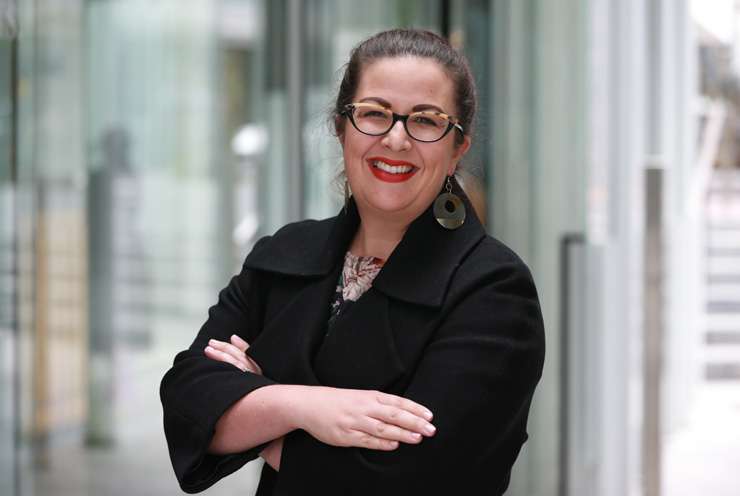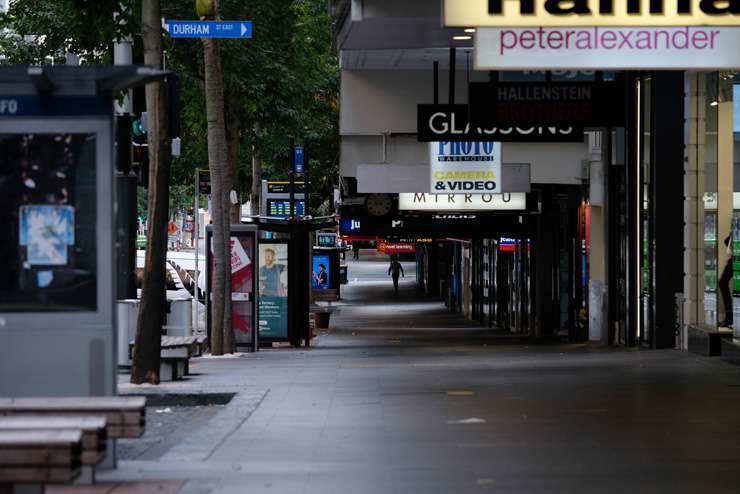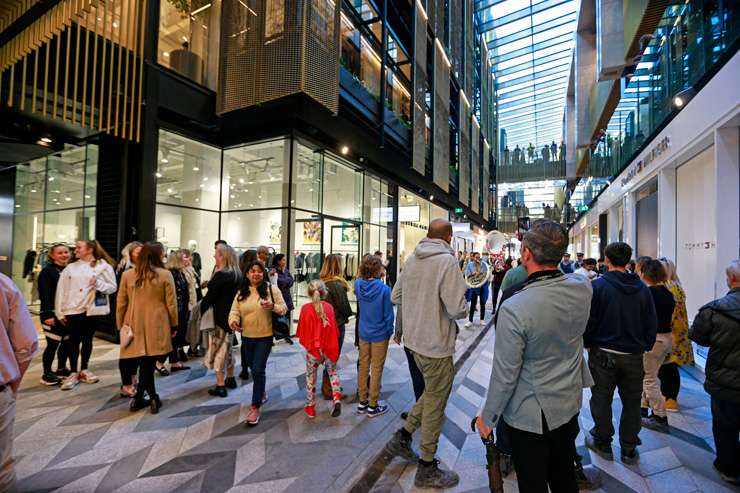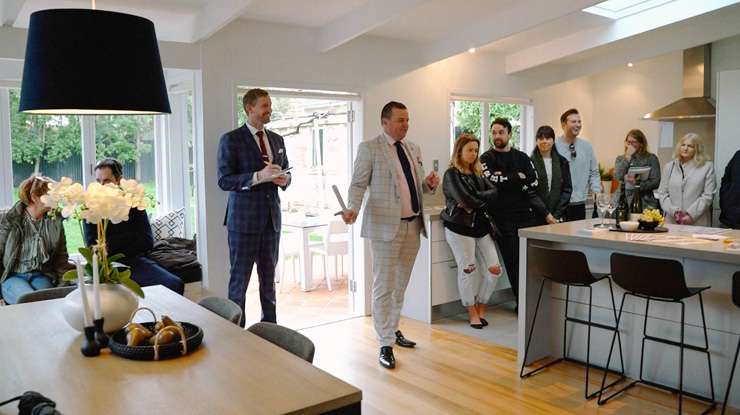At a press conference last week Prime Minister Jacinda Ardern described as “dangerous” calls to open New Zealand’s borders. Her words were a stark reminder that, while New Zealand is largely free of Covid-19, the rest of the world is still reeling from a virus that shows no signs of slowing.
“We get to enjoy weekend sport, go to restaurants and bars, our workplaces are open, and we can gather in whatever numbers we like,” she said.
The housing market has benefited from the country's relatively quick return to normality after a strict lockdown that put the brakes on the economy.
OneRoof's new housing market index, developed by its data partner Valocity, shows that though property values dropped as a result of Covid-19, they are starting to pick up again.
Start your property search
But there is concern that the market isn't home and dry just yet and that several internal and external factors could derail its recovery.
As OneRoof launches its Know the Landscape campaign to keep people informed about buying and selling post Covid-19, it has asked housing market experts what worries them most about the next six months, and what gives them hope. Everything from jobs and expats to fresh Covid-19 outbreaks and the arrival of a vaccine are discussed. The overall message is, yes, things are bad, but not as bad as first thought (bar a few potential catastrophes). There is some disagreement on issues but mostly the experts aren’t expecting a massive price slump.
1. Rising Unemployment
Economist and commentator Tony Alexander says unemployment is going up but not by as much as many people feared.
Mitigating the rise is that most of those losing jobs are in hospitality, tourism, retail and entertainment, which are low-paid occupations where many would not own a house or be in the market for one – and many were migrants as well, he says.
“Going into the GFC, 4 per cent of jobs were held by migrants on temporary work visas. This time it’s 8 per cent. Again, not property owners. Heavily concentrated in hospitality, retail, tourism, and, of course, they’re going to have to go home, so not a wave of selling from property owners there.”

Economist Tony Alexander has revised his house price forecasts on the back of stronger than expected sales activity. Photo / Supplied
Alexander is not discounting the negatives of rising unemployment and still believes house prices will fall this calendar year: somewhere in the range of 5-10 per cent. “But as each week or month goes by I’m pulling back to the 5 per cent area and away from 10 per cent average price decline,” he says.
John Bolton, CEO of Squirrel mortgage company, agrees that unemployment is spiking and much of it is in those non-home-owner occupations, but says that could cause problems for investors due to rent arrears.
“I think there will be some challenges there. Banks (which prefer to lend to owner-occupiers) will be less accommodating with investors,” he says.
2. End of the wage subsidy
Bolton is not too worried about the wage subsidy winding up, saying it was paid out in lump sums and some businesses have already let staff go: “The end of the subsidy doesn’t mean things just stop.”
Some businesses have dropped wages to 80 per cent and Bolton says one of his clients is on 60 per cent, but knows his salary will go up again and is grateful to still have a job.
“I think that’s the sort of pragmatism that you see come through. One thing employers know is the economy is going to come back again.”
They also know they will struggle to find good employees if they let staff go - and rehiring is expensive.
3. Super low mortgage rates
No one spoken to is particularly worried about the looming the end of mortgage holidays as interest rates are so low and banks and the Government would rather help, not hinder, those who are struggling.
While Dominick Stephens, Westpac’s chief economist, is sticking with his forecast of a 7 per cent decline in house prices from April to December this year, the exceedingly low interest rates are giving him pause for thought.
They are so low they could rescue the housing market a little bit, he says.
“Last year we successfully predicted the housing market would turn up. Most people thought house prices were really high and couldn’t possibly go higher. We said ‘no, interest rates have come down, that will drive house prices even higher.’”
Now, interest rates are even lower.
“That’s the reason I expect that - once you get into the post-recession environment, whenever that is – we’ll see quite a rapid recovery in house prices.”

Westpac chief economist Dominick Stephens believes low interest rates could save the housing market. Photo / Supplied
Alexander says low mortgage rates encourage people to look to property, and because of those low rates he doesn’t think people hanging out to snap up mortgagee sale bargains will get lucky, as home owners will be able to ride out the storm.
Financial adviser Hannah McQueen says though it’s never been so cheap to borrow, the question is how tough the bank criteria for lending will become.
“They’re unlikely to simply lend to anyone and everyone as the economy deteriorates, so while you might want to wait it out to see if prices fall, by then the banks may be less keen on lending to you.”
And John Bolton says the exceptionally low rates are working against any form of property correction. “The Reserve Bank will take interest rates as low as it has to take them for that not to happen. And banks have no interest in it either. If people have lots of equity in their properties, banks will let them ride it out," he says.
“You’re not going to see a lot of forced sales in this market and banks will do their damnedest to stay away from that.”
4. Recession
Stephens is blunt about the effects of a recession on the property market: “House prices fall during a recession, end of story. I use all sorts of factors in my modelling in normal times but during recessions, it’s different.
“You basically get fire sales, so some people lose their jobs and get themselves into a financial position where unfortunately they can’t sustain the house they’re in. Others, because it’s a recessionary environment, are less keen to take the house on, and house prices fall. That’s far and away the biggest factor,” he says.
However, there is a lot of evidence the economic whack is not as hefty as it could have been. “We’re still heading for a severe recession but it’s probably going to be a little bit less severe than our initial thoughts.”
5. Expats
Kiwis are flocking home and filling up our quarantine facilities but Gareth Kiernan, chief forecaster for Infometrics, says it’s still not known whether they will stay or head off again in the next six to 12 months and beyond.
“There are different types of people out there; people who were on OEs and have rushed home so may not be in the house buying market, and other people who might have decided to come back on a more permanent basis.”
The latter may be in the market to buy a house and if so the question is where. With working from home easier, instead of choosing the big cities they may move to areas like Hawke’s Bay or Nelson for lifestyle reasons, which could help push up prices in the regions.

Financial adviser Hannah McQueen: "While you might want to wait it out to see if prices fall, by then the banks may be less keen on lending to you." Photo / Doug Sherring
Alexander says the number of people coming back to New Zealand, along with those not leaving, are underpinning the housing market and offsetting the fall in immigration.
“The net flow of Kiwis to the country since 2001 has been a loss of 19,700 each year. Well, come December last year, that was a gain of 300 and in April it’s a gain of 11,100, so there’s basically an extra 33,000 people in the country over and above what we thought," he says.
“I think now migration in the calendar year 2020 is going to be higher, so if anything it is conceivable that Covid-19, in conjunction with a structural shift in Kiwis (not) shifting overseas, is going to boost net migration flows for the next 12 months."
This will have a positive impact on the housing market and prices, he says, pointing out New Zealanders would have spent around $10 billion on overseas travel this year but now will be spending on other things, and some of that will be housing.
6. Tourism
Stephens says with no international tourism the number of people on any given night requiring shelter in New Zealand is a lot less than pre-Covid-19 and will lead to Airbnb properties migrating back on to the market, impacting rental prices in key areas.
“I expect to see that coming through in Tauranga and up north, in places where a lot of properties are. Eventually that will affect house prices in those locations. Queenstown has already had the biggest decline and will have the biggest going forward.”
Stephens says the slowdown in population growth is another reason to expect house prices to fall and says returning Kiwis won’t be enough to change that.
7. New Clusters
Everyone agreed more outbreaks would be a big concern.
Says Kiernan: “The biggest worry about another outbreak is the economic impacts, just how much it impacts on businesses’ revenue and profitability and, therefore, their ability to keep employing people – but also the consequences around the uncertainty that brings back into the situation.”
Uncertainty calls into question people’s willingness to spend money or businesses hiring, or investing in the business.
“It’s great now, three months down the track, that as an economy we’re sort of operating as normal, apart from the borders, obviously; so people are feeling a lot happier. I’m not saying it’s returned to complete certainty but if you swing that around again and you have another significant outbreak and potentially are moved back to level 3 or worse, that starts to become almost cataclysmic in terms of the potential impact on the economy.”

Queen Street, in central Auckland, during alert level four. A renewed outbreak of coronavirus could see the country back in lockdown. Photo / Getty Images
If that did happen, people’s ability to keep paying their mortgage would be affected and prices would drop significantly: “There would be a whole lot of people forced to sell and not many people in the market to looking to buy.”
And if investors saw prices going down they might hold off buying, contributing to big price falls.
Alexander’s optimism is tempered by any return to level 3 or 4, saying there could be a new wave of redundancies.
“That’s why the Government’s poor border control so far has been the biggest threat to our economic recovery and the housing market. Businesses are going to face a decision in about eight weeks’ time, ‘do I keep on these workers I’ve carried through or do I let them go?’”
If employers believe another outbreak is coming they will let them go, but if they think things are under control they will keep them on: “This border control thing is the most vital factor for our economy in the immediate future.”
Bolton, too, says border control is an issue but the recent scare was probably well-timed to remind us to take it seriously. “We’re lucky, we can close our border and as long as they don’t stuff the process up we should be fine.”
8. A vaccine
On the flip side of another outbreak is the possibility of a vaccine emerging, although that’s a longshot. The longer a vaccine takes, the greater the likelihood of people who have come home staying and possibly buying a house, says Kiernan.
“If we’re still in a similar position early next year to where we are now; I think the longer people are here, the more settled they’re likely to become.”
However, if a vaccine arrives earlier, there could be an outflow of people overseas again.
Stephens thinks there won’t be a vaccine any time soon, but if there is says he would change his forecast.
“There are an infinite number of factors that could alter my forecast. When Covid-19 broke and we all pieced together what was going to happen to the economy we all thought a vaccine would be available by early next year. If anything the risk is it’s going to take longer than that.
“The time it takes to find a vaccine is going to influence everything, including the housing market.”
9. No transtasman bubble
There’s still a big question mark over when a transtasman bubble will get under way. Kiernan says though the Government has set aside funds to sustain various forms of tourism, the question is how long it can keep pumping money into those businesses to try to keep them alive.
A transtasman bubble would help, especially for towns like Queenstown, but not by nearly as much as the loss from the rest of the world not being able to come to New Zealand. “And Australians, we know, typically don’t stay particularly long and don’t spend a great deal compared to the likes of American and Chinese visitors.”
10. The election
Elections often make for a jittery housing market, but Stephens doesn’t think this one will do much harm.
The last election was crucial for the housing market with one party favouring a capital gains tax and the other against it. But the capital gains tax was canned and Stephens doesn’t see much material difference between the major parties and their approach to housing. A change of Government or Coalition partners wouldn’t change his outlook.
Hannah McQueen says people do get a bit nervous around elections but they delay plans, they don’t abandon them.
She agrees as neither big party is keen on a capital gains tax, there is nothing major to affect prices in a big way.
“Arguably, politicians will want to calm and reassure voters rather than scare the horses – but you wouldn’t rule anything out.”
Alexander also raised factors around working from home, the printing of money and the construction industry.
Working from home would likely boost demand for housing as it will be easier for homeowners to rejig their house, such as moving a wall to make an office, than if they were are renting.
The printing of money is new territory for New Zealand but when other countries printed money following the GFC it pushed up asset prices and that could happen here. In May, our Reserve Bank said there was a risk of upward pressure on asset prices as a result of quantitative easing.
Alexander also said banks being cautious about financing on new construction would lead to upward pressure on house prices.
Though builders are busy now finishing existing projects, there won’t be so many new developments which will alter the demand-supply balance, and push prices up.

Return to normal: Shoppers at the newly opened Commercial Bay shopping and food precinct in Auckland's CBD. Photo / Alex Burton
“We went into the GFC in 2008 with 58,000 houses/properties listed for sale in New Zealand. We went into this with 19,000, so we went into this with a big queue of frustrated buyers.”
He also says the country didn’t head into this crisis with a blowout in risky lending to the housing sector. LVRs were in place from 2013, and banks were working out people’s ability to service debt at 7.5 or 8 per cent rather than the 4 per cent or so rates at the time, building a buffer into people’s ability to pay.
And, in the five years going into the GFC, household debt grew over 80 per cent but in the five years leading into this crisis it grew less than 40 per cent, he says.
11. Supply and demand and first home buyers
Bolton says his company has seen more than a 200 per cent increase in applications from first home buyers and that group is now driving the market. “We’re frantically busy. We’ve had a huge increase in first home buyer activity, a massive increase. With interest rates so low it’s cheaper to own than to rent.

Ray White auctioneer John Bowring takes bids at an on-site auction at the end of June. The house, 19 Rose Road, in Grey Lynn, Auckland eventually sold for $2.67 million. Photo / Supplied
“My view is entry level house prices will not go down at all. The demand at entry level way exceeds supply, so you’re just not going to get a reduction in entry level house prices. If you go to any entry level property in Auckland at the moment, there’s people knocking doors down.
“Any price reduction would likely be in the upper end of the market where there’s less demand.
12. Confidence
For McQueen, confidence is hanging in the balance. Supply and demand are influenced by how confident people feel, she says. “When people are feeling confident they’ll get a good price they’ll put their house on the market. When they feel confident they’ll keep their job, they’ll buy or upgrade. I’m concerned a lot of small business owners in particular feel anything but confident so that is likely to filter through to their behaviour, which may result in more people sitting tight for a while, if they can afford to.”
13. Global economy
John Bolton says there is one risk we can’t control and that’s what happens in the rest of the world. “Our biggest trading partners are China and Australia, so what happens there is going to be important," he says.
“I think the scariest thing is the US market and what’s going on over there, because the US is such a big part of the global economy. At a global level we’re clearly going into a pretty nasty recession that will have a spillover impact on New Zealand - we can’t avoid it.
“You’d have to be a raving optimist to think there’s no pain coming, but I just think the amount of pain feels more manageable now than it did three or four months ago.”










































































